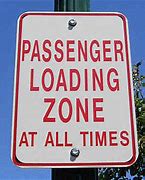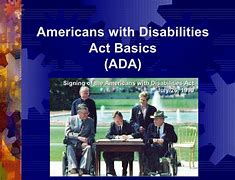Below is a review of the posts (on Facebook, LinkedIn, and Twitter) from the past week. You can check out the full posts by clicking on the links.

In the post on Sunday 4/18/21 we learned that ADA lawsuits over passenger loading zones are on the rise. Who’da thunk it?!? Apparently the hotspot for this is hotels in California and the main plaintiff is Theresa Brooke (represented by the same attorney who will not be named). You should recall that the ADA requires that if a passenger loading zone is offered, then at least one such zone must be provided for disabled persons. The ADA standard is referenced in the post. But what is a passenger loading zone? Not every hotel entrance. See the post for more on this (and how broad it may be).
TAKEAWAY: If your business is open to the public, then you must (in most cases) make accommodation so that it is accessible to disabled persons.

The post on Monday 4/19/21 went back to basics: what is a disability under the ADA? The purpose of the ADA is to provide persons with disabilities the same opportunities as able-bodied persons. It applies to employers with at least 15 employees in the areas of hiring, firing, discipline, promotion, compensation, training, and much more. And remember, it covers not only those with actual disabilities, but 2 other groups as well – see the post. So, what is a disability? The legal definition is a “physical or mental impairment that substantially limits one or more major life activities”. Take note of the expanded definition under one of the alternate prongs (again see the post). And note that under one of the alternate categories (as noted in the post), reasonable accommodation is not required. So back to the definition of a disability. It usually cannot be something transitory or temporary and is not something minor. The things an employer should consider are noted in the post.
TAKEAWAY: If the ADA is or may come into play, consult an experienced employment lawyer to keep you on the straight and legal.

can hoa/condo do that?
The post on Tuesday 4/20/21 told us that an HOA changed its rules after a BLM flag clash (claims the homeowner). Gloria Bernardino and her husband own a home in the Hearthstone community. They support human rights and in September 2020 started putting many signs and banners in their yard (examples are shown in the post and embedded VID). All good, right? Well yes … until the association changed its rules in March 2021, including authority for the Board to remove signs and flags that are in violation. The short list of what is approved is noted in the post. And can the association actually remove flags and signs that are not on the approved list? See the post.
TAKEAWAY: We reiterate: know what Boards (and associations) can or cannot do under the Governing Documents and applicable state law. Consult a community association lawyer.

From the post on Wednesday 4/21/21 we saw that a neighbor’s cooking displeases a resident – life in a community association. The facts here are from a condo situation, but could easily occur in single-family homes as well, especially in seasons when windows are open or people are living outdoors more. The question when something like this happens is if it actually involves the Association or is merely a neighbor-to-neighbor issue. The answer can depend on the Governing Documents or applicable law. But there might be things the association can do as noted in the post. And while acclimation is scientifically proven, I’m not sure it was appropriately part of the post.
TAKEAWAY: associations cannot control every part of every day in every life; k now what they can and cannot do and what (if any) other remedies exist.

to know and use
In the post on Thursday 4/22/21 we learned 5 key human resources practices (with the good stuff below the ad). First, know what laws apply to your business. This is so important. And know not only the law, but when it changes and how that change affects you. Next, have an HR procedure manual. Not an employees’ handbook, but for HR. It should contain the things noted in the post. Third, train your managers. Why? For the reasons noted I the post. The 4th and 5th tips, which are equally good, are also in the post.
TAKEAWAY: All employees are a team; it is important to the well-being of your business for the entire team to know what it needs to do to keep the business humming along legally and functionally.

a good thing for all
The post on Friday 4/23/21 asked: should employers require a checklist for remote workers? This question has developed much more relevance since the start of COVID – and both the question and answer are not going away. What would the checklist include? The employee’s responsibilities (what is expected of them) and the employer’s obligations (what is expected from the employer). The checklist should start with the state in which the employee is working (because laws vary by state), telecommuting plans (is it temporary or permanent, is it 10% remote or is there required time in the office, when will the job be moving back to the office (if appropriate), what are the start and stop times, and more as listed in the post), and the other 2 things noted in detail in the post.
TAKEAWAY: Remote employees are still employees, meaning they are under the control of the employer – so lay down the literal rules for everyone to know rights and responsibilities. Get legal assistance if required.

Finally, in the post yesterday 4/24/21, we asked: can an employer monitor social media accounts? The absolute, concrete answer is “Maybe”. Or “it depends”. Anything that is public is accessible to current or prospective employers. And if it runs afoul of rules or laws, then discipline (up to or including discharge) might apply. So, what type of post might get an employer’s attention? Anything that reflects negatively on the employer. That includes anything that reduces the employee’s productivity (which, as the study referenced I the post shows has been a problem) or disclosures confidential information or the other things detailed in the post. Complying with an employer’s social media policy (and any applicable laws) is a good starting point to stay ort of trouble. And can an employer go so far as to ask for an employee’s log-in information? See the post as relates to PA law.
TAKEAWAY: The safest course is for employees to keep personal social media accounts personal and stay away from anything related to the workplace or employer.

 York, Pennsylvania 17403
York, Pennsylvania 17403